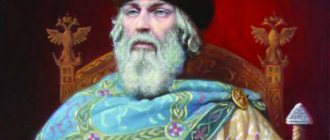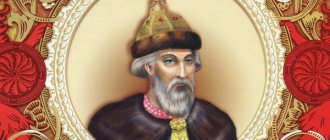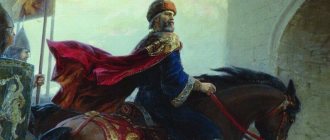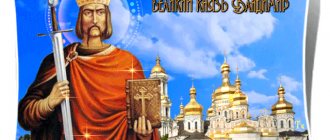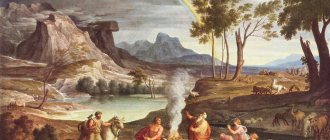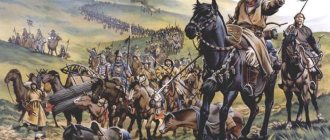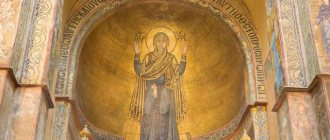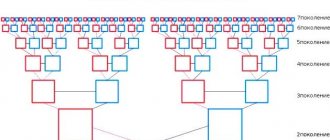During the heyday of Byzantium, the strengthening of its rival - the Holy Roman Empire, the atrocities of nomadic tribes, and intra-clan feuds, the prince in Rus' was Vladimir Monomakh. The land under his control had all the signs of statehood: the Orthodox religion, written law, centralized taxes, a single territory. Taking into account her problems, the ruler wrote “Instructions for Children,” which became a monument of literature of the 12th century.
Family tree of Monomakh
A descendant of the Rurikovichs, who opened the path “from the Varangians to the Greeks,” Vladimir Vsevolodovich was born in 1053. The glorious path was completed by the prince of Kyiv in 1125.
Monomakh's genealogy presents him as:
- grandson of Yaroslav the Wise;
- son of the first holder of the title “Prince of All Rus'” Vsevolod Yaroslavovich;
- a descendant of the Byzantine emperors Monomakhs from the Macedonian dynasty by maternal line.
Childhood and adolescence
Monomakh is translated as “combatant”.
The given name confirmed his readiness for any tests:
- since childhood, Rurikovich conquered the wilds of the Bryn forest;
- the youth defeated the hero from Kafa;
- At the age of thirteen he received the princely title and took part in military campaigns.
Vladimir's mother was Greek, his stepmother was Polovtsian Princess Anna. A multi-ethnic family shaped his peace-loving character traits. At 21, he himself became the head of the family. His English wife, Gita of Wessex, gave birth to five sons. She followed her husband on hikes. According to one version, Monomakh’s first wife rested in Palestine. His subsequent marriages took place after forty years.
Great Reign
The character and will of the future head of state were tempered in battles, and the Christian worldview was nourished. As he himself testifies in his instructional word, only the Lord preserved him in battles with animals, people and in extreme situations.
In various circumstances, the enemies and allies of the Grand Duke were:
- Cumans;
- torques;
- Rurik brothers.
Vladimir Monomakh was in no hurry to take power in Kyiv. But when he was almost sixty, a popular uprising broke out. It flared up immediately after the death of Svyatopolk and forced the prince of Pereyaslavl to accept the grand-ducal scepter in Kyiv. The death of his predecessor is surrounded by controversial historical implications. It was not the first sign of fratricidal conflicts among the Rurikovichs. But this is not surprising - power in all centuries has been obtained with blood. Monomakh's commandments to his children are an attempt to stop the vicious laws of wars between heirs to the throne.
The most significant events during Monomakh's reign were:
- Treaty of 1072 - “The Truth of the Yaroslavovichs”;
- congress in Lyubich in 1097;
- expulsion of the Cumans in 1111 to the outback under the specific name Tmutarakan.
Descendant of the Rurikovichs and Monomakhs - ruler and author of an ancient manuscript
At the end of the 18th century, it turned out that the library archive of Count Orlov’s adjutant, Musin-Pushkin, contained the Laurentian Chronicle with the “Teaching” of Monomakh. This manuscript managed to avoid the fate of most of the archive, which disappeared without a trace. The written statements of the rulers have historical significance. Among important state acts, a special place is occupied by instructions to the descendants of Vladimir Monomakh. Paying attention to the approximate year the commandment was written - 1099, it should be noted that by the time he ascended the Kiev throne in 1113, the author had all the makings of a supreme ruler.
The chapter of the Russian land united two principles:
- secular;
- spiritual.
Who is the author of the teaching and instruction does not arise for historians. This is Vladimir Monomakh himself. But in those days the Orthodox Church was subordinate to the Byzantine bishopric. It sent metropolitans to Kyiv. It is obvious that the tasks of secular power were formed under the influence of the religious literature of the holy fathers appointed by Byzantium. Therefore, Monomakh’s work is based on the “fear of God”, quotes from the Psalter of David. A contemporary of Monomakh and his spiritual guide was Metropolitan George, a Greek by nationality. This name appears in The Tale of Bygone Years. Also, an equally important role as his teacher in the period described is played by George’s successor, John II. They served as an example for the princes, as they themselves actively expanded ancient Russian writing.
Brief historical background
A boy was born into the family of his father, Vsevolod, and his mother, the daughter of the Byzantine Emperor Constantine Monomakh, whose name was inherited by a descendant. He was revered for his military services with the goal of uniting the Russian land.
The representative of the princely family grew up in an unstable political situation and internal internecine conflicts, and survived military strife with the Cumans, who posed a serious danger. The main event of his reign was the Lyubech congress of 6 Russian principalities on the issue of dividing the territory and unifying the army.
By nature, the prince was a very peace-loving person; he renounced the throne in favor of his brother, which indicates the pacification of his pride. In those conditions, conflicts for the throne usually occurred, which weakened the state. The desire of other representatives of the princely family of power undermined the foundations of the state and welfare of Rus'.
The main thing for the prince was faith in God, which formed the rules of behavior:
- keep promises;
- help the poor;
- respect elders;
- adhere to the right lifestyle and pray.
The best article for you, go to: The word luck in Orthodoxy
He opposed internecine wars and had a negative attitude towards the death penalty, took part in more than 82 campaigns and concluded dozens of agreements.
During his reign, he built several churches, erected stone walls around Kyiv, and laid a bridge across the Dnieper River. He wrote spiritual instructions to his heirs, left moral teachings for them, giving examples of his personal life. His main merit was the unification of lands and protection from Polovtsian raids.
Monomakh's commandments to his children
Faith based on Orthodoxy gave great hope. The prince lived for 72 years. When one of the three parts of the letter was published, he went through a thorny, sometimes dangerous path. The Lord of Rus' thanks the Lord for his life and calls on his descendants to live like him, and to judge others according to God’s law.
Genre, structure, style of the ancient book of Rus'
Teaching as a genre of ancient Russian literature has a didactic character.
The structure of Monomakh's work has three phases:
- Testament to children.
- Partial autobiography.
- Letter to Prince Oleg Svyatoslavlich.
The style of the author of the Instruction corresponds to the tradition of instructions that idealize the Old Russian Christian. And living speech, intertwining the personal and the universal, is recognized as a revelation of genius. By calling himself “thin,” the Greatest Ruler of Rus' demonstrates humility before the memory of his ancestors. The interpretation of many phrases of the “Teachings” is given by Kuprin, Pogodin and others. For example, the meaning of the expression “sitting on a sleigh ...” is explained as gratitude to the Almighty for the life lived, understanding the importance of passing on experience.
Plot and compositional elements of the “Teaching”:
- As an exposition, the incident with the brothers' conspiracy is described.
- The basis of the plot was made up of references to the Psalms.
- Stories of personal salvation were the highlight.
- The main intrigue - and this is also the finishing part - was the advice to be courageous, not to run away from fate, and to trust God.
- Stylistically, Monomakh’s work represents a single compositional whole.
- Replete with folk speech, he surprises with vivid metaphors and epithets.
History and content of the first part of the message
The reason for the message, as the author himself testifies, was an attempt to conspire between the grandchildren of Yaroslav the Wise against the Rostislavichs from the Galician dynasty. The ancient Russian prince-writer motivated his refusal to the conspirators with the vow of “kissing the cross.” To find confirmation of the fidelity of his chosen path, Monomakh reads revelations from the Psalter. He opens it to a random page. It must be said that even today many people use this ancestral method to answer the burning questions of life.
The Psalter suggested:
- trust in the Almighty;
- be meek;
- strive for righteousness.
Therefore, Vladimir believed that “the sword of the wicked will strike their heart,” and life will have mercy on a pure person. Remembering the father of the Russian church, Basil the Great, Vladimir conveys his Christian commandments.
Autobiographical examples in the teachings of Vladimir Monomakh
The second part of the ancient historical document contains a story about the life of the author himself. The date of creation of this creation falls on the active phase of Monomakh’s life. Being a workaholic, getting up before dawn, the head of state of Rus' calls on his children to the same rhythm of life and to responsible service to their homeland.
As a respectable person and family man, he names the cause of death of soul and body:
- lie;
- drunkenness;
- debauchery
The advice to “study” is highlighted in a special line in the letter. He uses his father as an example, who spoke five languages. From the “Instructions” we learn that Vladimir had 83 large campaigns, after which his rivals asked him for peace more than 20 times. The culminating message is the call to be courageous and not be afraid of fate.
Letter from Monomakh to Oleg Svyatoslavlich
Vladimir and Oleg were cousins. 1096 - the year of their civil strife near Starodub - ended with the expulsion of Oleg from Chernigov. In the next battle near Murom, Monomakh’s son Izyaslav was killed. The children of Monomakh did not want blood feud and offered peace to Oleg, but he refused. Only after a series of unsuccessful battles did Oleg agree. In those days, letters from princes were called letters. One of these letters during the described period was the “Letter to Oleg Svyatoslavovich.” From a moral point of view, literacy carries the highest humanistic values, since the winner shows tolerance, forgiveness, and love for the vanquished.
Main postulates
The main position of Monomakh was faith in God. From this follows his chosen strategy of behavior, approved and supported by Christianity. The prince kept the oaths given to him, helped the poor and weak, respected his elders, and led a righteous lifestyle. In his essay, he pointed out the need to lead a righteous life.
The ruler also noted the need for prayers. A more ancient motive can also be traced in Monomakh’s will. It is noticeable that honoring the guest was of particular importance to the ruler. There has long been an unwritten code according to which welcoming a guest into the house was mandatory, regardless of time and living conditions. The only acceptable condition for meeting a stranger was the fabulous “feed, drink and put him to bed.”
A traveler who looked at the light was an inviolable person. Even asking about who came from where was not omitted. Only the traveler himself could tell this at his own request after being accepted by his hosts. The test reflects a set of ideas of everyday and religious morality. As a wise politician, Monomakh opposed state fragmentation. He became convinced that the thirst for power was destroying the stability of the state. In internecine battles using intrigue and the involvement of external military forces, the author saw only the weakening of the well-being of Rus'.
Vladimir Vsevolodovich himself did not increase the influence of his order. It is known from history what resulted in the reluctance of descendants to analyze the “Teachings of Vladimir Monomakh” and listen to the wise advice given there. The Tatar-Mongol armies that swept across Rus' defeated the princes who were estranged from each other, establishing their own rule for centuries.
The topic of Christian values was also raised. The author encouraged people to believe in God and help those in need. At the same time, the ruler did not advocate a complete renunciation of wars. As a politician, it is impossible for a ruler to ensure the security of the people and the country as a whole without military force.
The significance of the Teaching in history
History loses its meaning when it uses dubious conclusions. But it is difficult to distort it, having in hand letters from eyewitnesses. The most inveterate skeptics do not doubt the truth of Monomakh’s “Teachings”. And the sincerity of his presentation reveals the main features of his personality. The power of Rus' grew in a difficult struggle. She survived betrayals, raids, wars.
But the most important thing for the ruler was:
- the ability to define a common goal;
- the desire to sacrifice private interests for the sake of the Fatherland.
This is precisely what Monomakh’s appeal to his descendants is dedicated to, built on the Orthodox faith and love for his compatriots, for the Motherland. To write instructions in the Christian spirit at the beginning of the 12th century meant to set guidelines for the management of the Russian land. As a genre of ancient Russian literature, the work became immortal.
